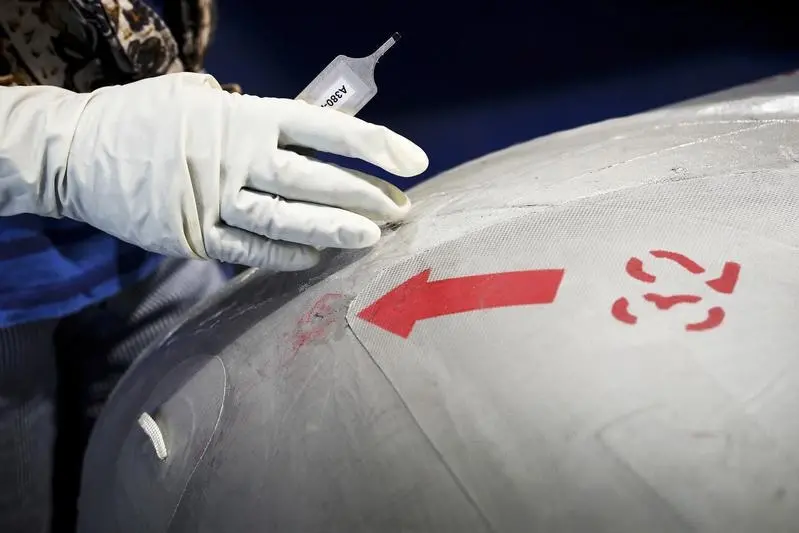PHOTO
With the new year marking the halfway point in Morocco's ambitious 2014-20 Industrial Acceleration Plan, efforts are accelerating to develop both burgeoning and established industries in the country.
In September the Moroccan government signed a memorandum of understanding with US-based aeronautics giant Boeing to establish an industrial zone for the segment.
Under the deal, Boeing’s operations in the zone will source parts and services from a supply chain of local aerospace suppliers, creating 8700 skilled jobs and generating $1bn in exports in the process.
Full speed ahead
Morocco’s aeronautics segment has made significant strides in recent years, growing from virtually non-existent in the year 2000 to about 120 manufacturers at present.
In 2015 the segment saw exports reach Dh7.3bn (€685.2m), gaining further momentum in 2016 as this figure climbed to Dh5.7bn (€535.8m) in the first eight months. This put full-year growth on track to surpass the previous year.
Like aerospace, the country’s automotive industry has surged in recent years, reaching record export levels for the third straight year in 2016, with the 316,712 units shipped abroad representing a 22.4% year-on-year rise.
Part of this growth came from an 18% production increase at France-headquartered Renault’s plants in Tangiers and Casablanca, which scaled up to meet growing demand in Egypt, Tunisia and Turkey.
In the zone
This number is set to rise further in the medium term, as a new production facility being built by French manufacturer Peugeot in the Atlantic Free Zone of Kenitra begins operations in early 2019.
Plans for the €557m plant, first unveiled in June 2015, include an annual production capacity of 90,000 units, eventually expanding to 200,000 as sales pick up.
The new facility is expected to create knock-on benefits for the local components industry. The Atlantic Free Zone of Kenitra, operational since 2012, hosts eight manufacturing plants that employ more than 6500 people under firms such as French manufacturer Saint Gobain.
In anticipation of Peugeot’s new factory, the firm plans to expand annual production capacity at its Sekurit plant from 400,000 to 1m units this year. Currently, some 95% of output goes to Renault’s Tangiers plant, with the rest channeled to the German auto manufacturer Opel in Spain.
Part of the plan
As the overarching framework behind these developments, the Industrial Acceleration Plan is aimed at expanding manufacturing to attract jobs to the country and raise industry’s share of GDP from 14% to 23% by 2020.
While the 34m-person domestic market holds promise, the government is also calling on sector stakeholders to pursue partnerships with other African countries to make Morocco a strategic gateway for international investment aimed at the continent’s 1.2bn consumers.
“Countries that continue to attract large amounts of FDIs offer more than just cost competitiveness, they also offer access to larger markets,” Anas Kabbaj, general manager of GE Morocco, told OBG. “With a relatively small domestic market, Morocco must continue investing to offer the best environments to foreign companies looking to manufacture here and export to European and African markets.”
To achieve this vision and raise the country’s profile, King Mohammed VI embarked on high-level visits to a dozen African countries in the past year. In February alone, the king will have visited Ghana, Côte d’Ivoire, Guinea, Kenya, Mali and Zambia, accompanied by a business delegation of key industry players.
These diplomatic and trade missions, combined with Morocco’s readmission to the African Union (AU) in January after a nearly 30-year absence, should lay a healthy foundation for intra-regional trade.
Looking ahead
While the country’s GDP growth fell from 4.5% in 2015 to 1.6% last year, combined exports from the automotive, aeronautics, electronics, textiles and agri-food segments saw an increase of 9.2% on 2015, a reflection of manufacturing’s growing economic weight.
Although such figures portend fast-paced industrial growth, to continue drawing foreign direct investment (FDI) Morocco must improve its development strategies to address potential bottlenecks and other challenges.
In the World Bank’s “Doing Business 2017” report, Morocco maintained its overall ranking of 68th out of the 137 countries surveyed in ease of doing business, but showed a marked improvement in the category of protecting minority investors, rising 31 spots to 87th. It also gained ground in the categories of registering property (82nd), getting credit (101st) and trading across borders (63rd).
Looking ahead, human resources will be a particular focus. The country faces challenges in keeping up with certifications in the highly specialised aerospace industry, which requires skilled workers with proven credentials.
To foster a steady supply of qualified labour, Morocco has built two training centres in Casablanca – the Aerospace Logistics Training Institute and the Aerospace and Airport Logistics Training Institute – that enjoy state subsidies of up to Dh40,000 (€3700) for each person recruited annually.
© Oxford Business Group 2017





















